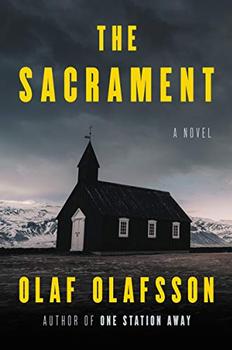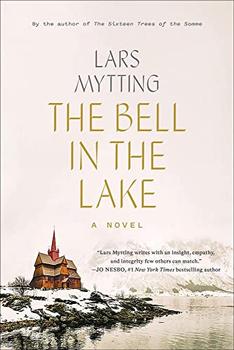Summary | Excerpt | Reviews | Beyond the book | Read-Alikes | Genres & Themes | Author Bio

A Novel
by Olaf OlafssonIt is 2009 and Sister Johanna Marie lives a quiet life in a convent in the rural French countryside, tending to her beloved rose garden and spending time with George Harrison, her rescue dog that resembles her favorite Beatle. Her twilight years are shattered, however, when a person from her past arrives, seeking her assistance on a matter she considered settled two decades ago: the case of Father August Frans, who leaped from a church tower to his death in Iceland in 1987. The letter is from the sole witness to Frans' death, a young boy who is now a man, and contains the ominous words, "I didn't tell you everything…"
And so begins Olafsson's ambitious novel The Sacrament, which explores in elegant and hushed tones the inner sanctums of one woman's heart as she journeys back to a cold, forbidding landscape to settle—once and for all—the mystery of Father August Frans' death and her role in attaining justice within an indifferent Catholic Church. But this journey back to the scene of the crime is only one of three interwoven storylines, each set in a different time and place, and representing a different stage of the protagonist's life.
We see Pauline (her name before taking vows) as a young student in Paris at the Sorbonne in 1965, then as Sister Johanna Marie investigating the allegations of abuse around Father August Frans in late 1987, and finally her return to Iceland in 2009 upon receipt of the enigmatic letter that reopens the official case. We learn Sister Johanna was selected to assist in this investigation because of her fluency in the Icelandic language. Some of the most beautiful moments of the book appear as amber memories of her days as a student, sharing a room with an Icelandic girl named Halla. Halla is everything Pauline is not: outgoing, spontaneous and trusting to a fault. Their friendship is the great arc of the story from beginning to end, one that defines and then redefines Sister Johanna in the wake of her discoveries in Iceland, both in 1987 and 2009.
Beautifully rendered, Iceland is another major character of the story. Olafsson treats the uninitiated to rich depictions of endless horizons, mixed with bitter cold and blowing snowdrifts that swirl around one's vision until no light is seen. It is a frigid, lonely landscape, one that mirrors the barrenness of the human heart in the face of regret and remorse.
There are some slight issues in the telling, however. The weaving of the multiple storylines, especially of the two visits to Iceland, can be slightly difficult for the reader to follow. It could take half the book before one realizes there are two journeys to Iceland 20 years apart, the first when Sister Johanna is sent to investigate charges of abuse against Father Frans, and the second after she receives the letter from the sole witness to Frans' death. In addition, the artistic decision to eschew quotation marks for dialogue stalls the delivery as one tries to discern an inner thought from a verbal statement.
With these quibbles aside, however, The Sacrament is a powerful exploration of faith and the crucial role that doubt plays in its inception and maintenance. With its reverent language of memory and regret, longing and loss, justice and vengeance, the book seeks to find its own answer to which is the greatest of these qualities: faith, hope and love. The beauty in Olafsson's prose is that each reader may come away with a different answer.
![]() This review was originally published in The BookBrowse Review in January 2020, and has been updated for the
September 2020 edition.
Click here to go to this issue.
This review was originally published in The BookBrowse Review in January 2020, and has been updated for the
September 2020 edition.
Click here to go to this issue.

If you liked The Sacrament, try these:

by Lars Mytting
Published 2022
The engrossing epic novel - a #1 bestseller in Norway - of a young woman whose fate plays out against her village's mystical church bells.

Drive Your Plow Over the Bones of the Dead
by Olga Tokarczuk
Published 2020
In a remote Polish village, Janina devotes the dark winter days to studying astrology, translating the poetry of William Blake, and taking care of the summer homes of wealthy Warsaw residents. Her reputation as a crank and a recluse is amplified by her not-so-secret preference for the company of animals over humans.
All my major works have been written in prison...
Click Here to find out who said this, as well as discovering other famous literary quotes!
Your guide toexceptional books
BookBrowse seeks out and recommends the best in contemporary fiction and nonfiction—books that not only engage and entertain but also deepen our understanding of ourselves and the world around us.